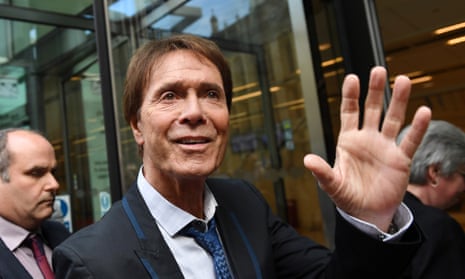When the actor Gorden Kaye was hoodwinked, as he lay in hospital recovering from brain surgery in 1990, by a Sunday Sport reporter dressed as a medic, there was no part of English law that suggested his privacy had been invaded. Scroll forward nearly 30 years and the world is a different place, transformed not just by the internet and 24-hour news, but also by the attempts of the rich and famous to argue that their right to privacy trumps that of the public’s right to know.
This battle has just taken to the skies in a helicopter piloted by the BBC and crash-landed into the home of Cliff Richard. The list of casualties includes not just the BBC’s reputation, but the principle of open justice itself.
No matter how much the world has changed since Kaye sued Sunday Sport, one of the most important principles of the British legal system – almost 1,000 years old and one of its most successful exports – is that justice must be seen to be done. In the words of social reformer Jeremy Bentham, “publicity is the very soul of justice”.
As long as the media reports accurately – making it clear when a suspect is under investigation for a serious crime, rather than arrested or charged – there should be no bar to the public knowing what is going on. The argument that public shaming is not in the public interest – made by Richard and other celebrities – can be answered by the equally important principle of innocent until proven guilty. The BBC verdict is potentially even more disastrous given the fact that historical sex abuse – the allegations made against Richard – thrived in a culture of secrecy.
Despite all this, the unpalatable truth is that, while most journalists, including myself, would die in a ditch to continue to name anyone under police investigation, this scandal is proof that it is nearly always bad cases that make bad laws. None of the fundamental arguments on open justice excuses the fact that the BBC made two catastrophic misjudgments. The first was sending a helicopter to film South Yorkshire police rifling through the former pop star’s drawers during a raid on his home in Sunningdale, Berkshire, in August 2014. Not just because of the “somewhat sensationalist” nature of the live coverage of an early investigation, but because of what it said about the culture in the BBC news department.
The 200-plus-page ruling by Mr Justice Mann makes for excruciating reading. No one who has worked in a newsroom will find the examples of swaggering bravado (the reporter talking of putting the police “over a barrel”) or humour (“did he sing Jailhouse Rock?”) surprising. But it gives the impression of a macho culture, where making sure rival news channel ITV did not get wind of the investigation first was key.
Fran Unsworth, the most senior BBC executive in charge at the time, has said: “Even had the BBC not used helicopter shots or run the story with less prominence, the judge would still have found that the story was unlawful, despite ruling that what we broadcast about the search was accurate.”
The BBC has done nothing wrong. Its reporting, even Mann agreed, was accurate and it is easy to support any attempt by the corporation to hide in plain sight. Mistakes in fast-moving environments are inevitable. Subsequent mistakes are less so. After June 2016, when Richard was told he would face no charges, why did the BBC not try harder to settle the case, as the police did to the tune of £400,000?
The BBC will argue that Richard would not accept anything other that a settlement on the basis that those under investigation should remain anonymous. But media lawyers say a deal could have been reached without going to a court – the chancery division, which is known to be less than sympathetic to the journalistic cause.
Admitting errors and apologising as soon as possible has to be the quid pro quo of media organisations that want to enjoy existing freedoms. If Richard continued to argue against this, he would have had to accept public discussion of his desire to keep allegations against possible abusers secret. How many people agree with his statement that “I’d rather 10 guilty people escape than one innocent person suffer”?
Mann has set a terrible precedent with his verdict and the BBC should appeal it, supported by those who care about press freedom. The response from all the newspapers has been to do so.
But the BBC failed to follow high standards with its use of a helicopter and the delay in showing contrition. This comes as the media is under attack by creeping uses of privacy laws. Whether through the Data Protection Act, used by Richard, or the growing use of article 8 of the Human Rights Act, which came into force in 2000 and enshrined a right to privacy in the UK, the media must defend itself. The nature of this case means it must do so with a heavy heart.
- This article was amended on 23 July 2018 to correct the spelling of Gorden Kaye in the first paragraph.

